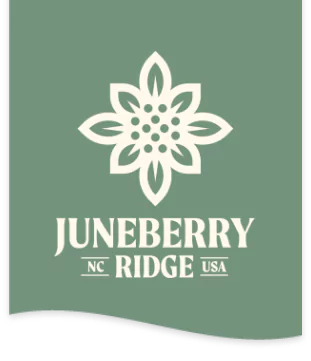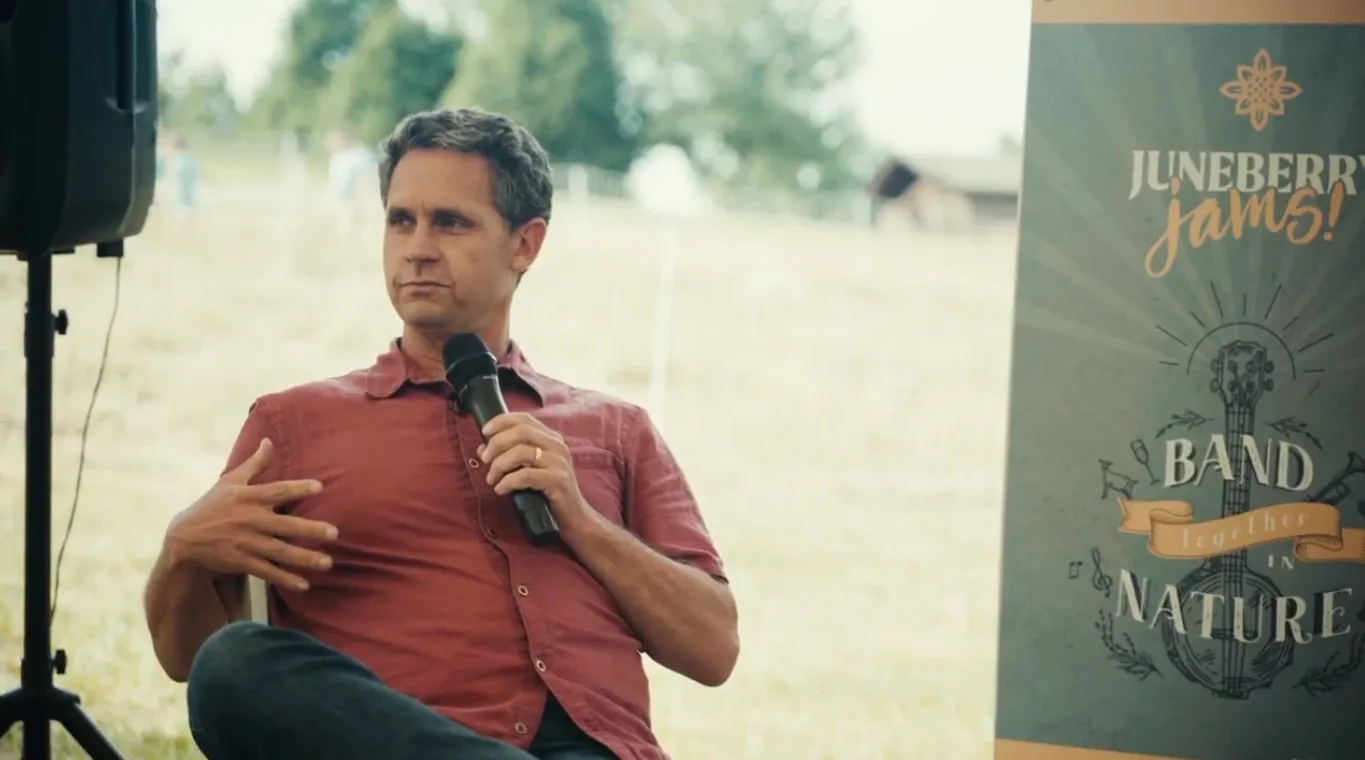Harmony in Agriculture: Listening to the land
What if every decision you made could contribute to a healthier planet? From the groceries we buy to the habits we cultivate, we all play a part in nurturing our land for future generations. Watch the full fireside chat below.
Starting small, thinking big.
At 5:15pm on June 1st, the first fireside chat of our 3-weekend long Juneberry Jams festival began with Ashton, our Chief Operating Officer, introducing our first guest speaker, Jack Algiere, Chief Agroecology Officer at Stone Barns Center for Food and Agriculture. Jack, a leader in the farm’s innovation programs and trainer of farmers new and veteran, began with a simple call to action: start small and think big.
Simple habits like composting kitchen scraps, implementing cover crops into rotation, or using natural fertilizers were highlighted as crucial steps toward building a resilient agricultural system. When nurtured consistently over time, these practices can significantly improve soil health, biodiversity, and overall farm regeneration.
Jack urged attendees to consider the impact of their choices on the environment. From small, daily decisions to larger, more strategic initiatives, each action contributes to the tapestry of our agricultural community. By embracing our roles as stewards of the land, we can foster a more harmonious relationship with the planet and pave the way for future generations.
Supporting local agriculture.
“Every dollar spent on locally grown food generates twice as much income for the local economy compared to a dollar spent in a supermarket chain.” says USDA’s Economic Research Service.
This message emphasizes the importance of supporting local agriculture; Buying directly from local farmers not only ensures fresher and more nutritious produce but also strengthens the economic fabric of our communities. If you have the means to, Jack encourages us to grow our own crops as well! It’s a tangible way to forge deeper connections between consumers and producers, reinforcing the value of locally sourced food systems.
Even more than the economic impact, there’s real community impact too. The more we connect with farmers, and the more farmers can connect among themselves, the more empathy we’ll build for each other. The result is we’ll naturally find more ways to collaborate. In reality, we’re always in cooperation, and cooperation is an essential part of a life well lived. As Jack puts it, he wouldn’t choose to hide in the hills and do it all alone, he and many farmers find joy and fulfillment in serving their community.
Far beyond what they grow, farmers intimately know the health of the land.
Central to the ethos of regenerative farming is the concept of developing a genuine relationship with the land. “Farms are not just workplaces; they are living ecosystems shaped by generations of stewardship and care.” says Jack.
Understanding the unique characteristics of one’s farm—its soil composition, microclimates, and natural resources—is foundational. This intimate knowledge empowers farmers to make informed decisions that promote soil vitality, biodiversity, and long-term sustainability. Just as families nurture their children with love and attention, caring for a farm involves daily exertion and a deep respect for the natural rhythms of the land.
As Jack puts it, we may all have an issue top of mind about food and agriculture. These may relate to food access, quality and degradation, or the chemicals sprayed onto our foods. Whatever the issue, the solution is actually that we can take better care for each other.
The same way a parent might look at their child, or spouse and know if they are happy and well, or tired and sick, the farmer looks at their land with eyes of understanding. Details unseeable to most are keenly observed through years and decades of developing a feeling for the land. When we choose to support local farmers, we’re casting a vote for people just like that, true stewards of healthy land and healthy food.
What Jack highlights is that, as consumers, we aren’t separate from our local farmers. When we make a habit of shopping at a farmers’ market, or book experiences at farming destinations, we are undeniably part of, and valued contributors to, that very same farmer and every aspect of the land they manage. When we reflect on that, we might be able to see how deeply we are connected, that we are a community working together in ways we scarcely realize.
Ashton Thompson, COO of Juneberry Ridge pointed out that the answer is staring right at us. Within our language and the word “agriculture”, the “agri-“ part is junior to the “-culture” part. This tells us a lot about how important the farmer-community relationship is for our collective health.
In summary, Jack shared four principles from nature that guide his approach to farming.
- Soil is the foundation of all life and health. It’s the first and last thing to pay attention to. Everything in soil is living in our own bodies, too. The elements, the carbon, the minerals, the proteins, and yes, even the bacteria are all part of us.
- Diversity is an essential part of nature. The more ways we find to mix and interconnect people and plants and animals, the more resilience we’ll build into our food systems.
- Waste is unnatural. Nature doesn’t produce waste. The more we focus on keeping energy and resources in cycle, the better we’ll be able to work with nature instead of against it.
- We are all connected. Finally, we’re not separate from nature, or each other. Our farmers directly connect us to the land. Our chefs and kitchens are like speakers and amplifiers in that conversation. As consumers, we are more than audiences. We choose where to focus our attention and it’s our attention that determines our actions and the actions of others.
From our Juneberry Jams journey, it’s clear that there’s an important connection between regenerative farming practices and our collective well-being. By reconnecting with the land, embracing our responsibilities as Earth’s caretakers, starting with incremental changes, supporting local agriculture, and fostering meaningful relationships with our farms, we can collectively contribute to building a better future.
About Juneberry Jams
Juneberry Jams is an annual summer festival celebrating regenerative agriculture, great music, and farm-fresh food in Stanly County, North Carolina. The festival is hosted by Juneberry Ridge, a 750 acre farm, education center and events destination in Norwood NC. There’s no better place to build community and learn about soil health, local food, and holistic farm management than the local farms forging the path for healthier agriculture.
Juneberry Jams was made possible by title sponsor and community partner, Uwharrie Bank as well as Kinetic by Windstream, and Visit Stanly. Community sponsors also included local business leaders, Stokes Construction, Precision Mechanical, and Uwharrie Technology. Music programming was produced in partnership with Charlotte-based non-profit, Tosco Music.
About Jack Algiere
Jack Algiere is the Chief Agroecology Officer and the founding farmer of Stone Barns Center for Food and Agriculture in Pocantico Hills, NY. Jack graduated from the University of Rhode Island with a degree in horticulture and has been actively farming since the early 1990s. His lifetime of experience in organic, biodynamic, and ecological systems brings a broad diversity of experience in greenhouses, orchards, fields, and pastures.
At Stone Barns Center, Jack oversees the extensive and diverse farming operations, integrating multispecies pastured livestock, grains, field crops, greenhouse, fruit, flowers, and compost in a four-season agroecological system. He also oversees the greater public and wild landscape as elements of the whole farm system. Jack is a leader in the farm’s innovation programs and is integrally involved in training beginning farmers. On the side, with his wife and fellow farmer, Shannon, Jack has two farm-raised sons. He plays the drums, is captain of the local volunteer fire department, and sits on the board of Johnny’s Selected Seeds.





















































